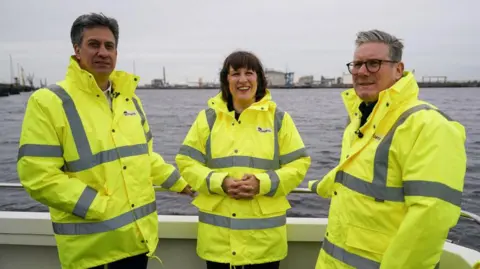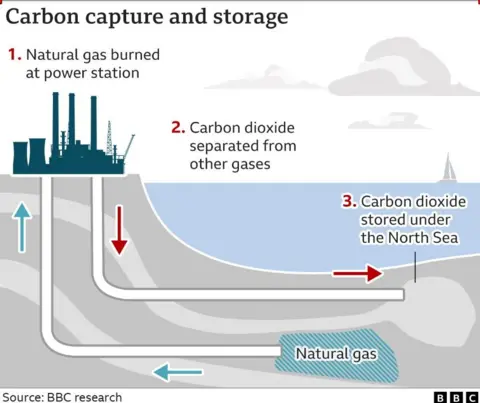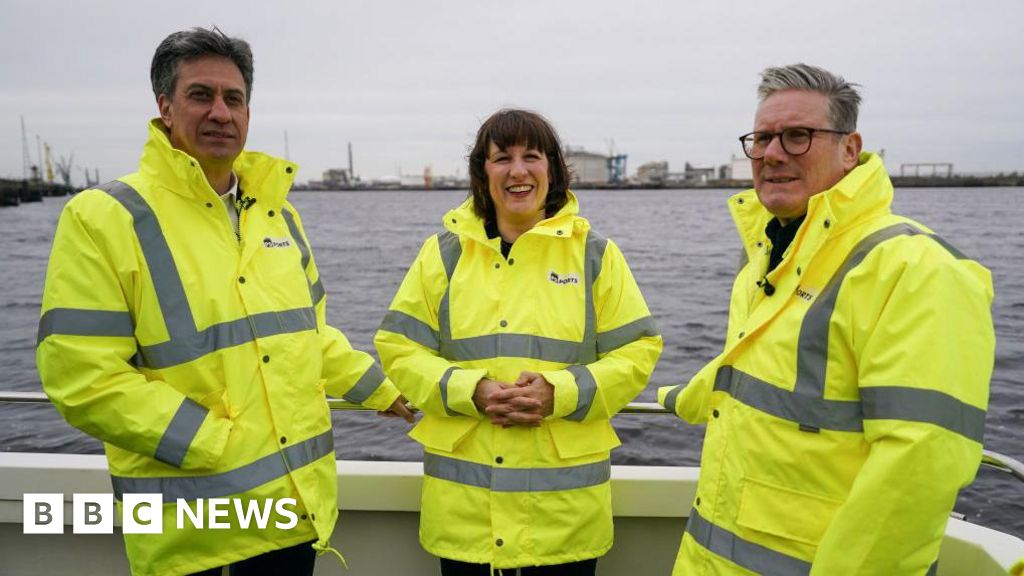 Getty
GettyThe government has pledged nearly £22bn for projects to capture and store carbon emissions from energy, industry and hydrogen production.
It said the funding for two “carbon capture clusters” on Merseyside and Teesside, promised over the next 25 years, would create thousands of jobs, attract private investment and help the UK meet climate goals.
Sir Keir Starmer, due to visit the North West on Friday with Chancellor Rachel Reeves and Energy Secretary Ed Miliband to confirm the projects, said the move would “reignite our industrial heartlands” and “kickstart growth”.
But some green campaigners have said the investment would “extend the life of planet-heating oil and gas production”.
‘Game-changing’
Carbon capture and storage facilities aim to prevent CO2 produced from industrial processes and power stations from being released into the atmosphere.
Most of the CO2 produced is captured, transported, and then stored deep underground.
It is seen by the likes of the International Energy Agency (IEA) and the Climate Change Committee as a key element in meeting targets to cut the greenhouse gases driving dangerous climate change.
Despite Miliband first announcing plans to develop carbon capture projects for power plants in 2009 during the last Labour government, little progress has been made since in the UK.
Up to £21.7bn will subsidise three projects on Teesside and Merseyside to support the development of the clusters, including the infrastructure to transport and store carbon.
It will also support two transport and storage networks carrying captured carbon to deep geological storage in Liverpool Bay and the North Sea.
The government said the move would give industry confidence to invest in the UK, attracting £8bn of private investment, directly creating 4,000 jobs and supporting 50,000 in the long term.
It will also help remove 8.5 million tonnes of carbon emissions each year, officials said.
The projects are expected to start storing captured carbon from 2028.

Last year the Conservative government announced £20bn plans for carbon capture, but Labour said it had never committed any cash.
In her strongest indication yet of a significant increase to levels of state investment, the chancellor said contracts such as this were never signed by the previous government because it did not prioritise capital investment – which is money spent on items such as buildings, equipment, and IT.
Reeves added: “This game-changing technology will bring 4,000 good jobs and billions of private investment into communities across Merseyside and Teesside, igniting growth in these industrial heartlands and powering up the rest of the country.”
Emma Pinchbeck, chief executive of Energy UK, described carbon capture, utilisation and storage as a “tool in our armoury of technologies which we need to decarbonise parts of energy that we currently can’t do with clean electricity”.
James Richardson, acting chief executive of the Climate Change Committee, said: “It’s fantastic to see funding coming through for these big projects.”
However Greenpeace UK’s policy director, Doug Parr called for spending instead on offshore wind or nationwide home insulation.
He said £22bn was “a lot of money to… extend the life of planet-heating oil and gas production.”
Meanwhile Friends of the Earth says the government should be spending the money insulating people’s homes, not on a technology it says will just extend the lifespan of the fossil fuel industry.
The Merseyside and Teesside projects are part of several announced in 2023 to capture and store 20-30 million tonnes of CO2 a year by 2030.


